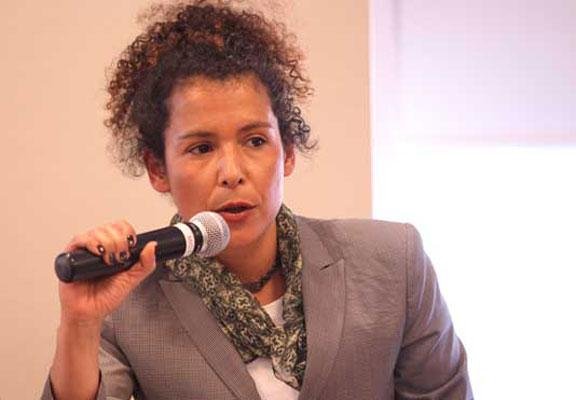Mariane Pearl (WEN/Because I am a Girl Campaign)
{WOMENSENEWS}-- {i:Mariane Pearl, the journalist best known for her 2003 memoir "A Mighty Heart: The Brave Life and Death of My Husband, Danny Pearl," is partnering with Plan International, a London-based advocacy group, as it joins in celebrating today's launch of the International Day of the Girl Child.
The day--recognized by the United Nations General Assembly--is being used by many advocacy groups to highlight their pro-girl causes and efforts. Plan International hopes it will help its ongoing global campaign, Because I am a Girl, set to benefit 4 million girls by 2016 through projects and funding.
Pearl, also the author of "In Search of Hope: The Global Diaries of Mariane Pearl," a collection of essays profiling female activists and leaders, is now working on her third book about the Cuban revolution and in November will teach a short course for female journalists from developing countries in Barcelona.
Earlier this week Women's eNews interviewed Pearl, 45, an author and documentary filmmaker of 20 years and the mother of one child.}
Q: What is your vision for improving the prospects for girls?
As a journalist what I would like to see . . . [is that] every girl in every country can think of--or can refer to--someone from her country who understands her conditions and contexts. Someone that she can look up to, who shows her the way. Our work as journalists is to identify these people and to give them that voice knowing they represent so many other people. I would like to see that these girls have a voice.
Q: As a female journalist frequently traveling alone in different countries, have you ever had problems or been discriminated against because of your gender?
Not personally, because the thing is, it's easier in a lot of countries where it is difficult for women to work if you are a foreigner, because you become another category altogether. I am a woman, but being a foreigner, I don't count as a woman. That has helped me. But I could see that for my female colleagues in some countries they experience difficulties that I have not encountered myself.
Q: What do you think is the most effective way to empower girls and women that isn't receiving enough attention?
To me it is definitely education. A lot of women do not have the slightest idea about their resources and how to defend their rights. So, having some sort of knowledge about the legal system for the way they can exercise their rights, while being able to live in their communities, is quite important. Education is at the heart of everything. That is what is going to stop women from getting married early, from accepting domestic violence, from not claiming their rights.
But maybe it would be time now as we develop this campaign to think what type of education do these girls need? A lot of women are afraid to talk about what is going on, what is happening to them because they think of their retaliation . . . so I think the education needs also to fit the needs of people.
(Editor's note: on Monday, Oct. 9, the AP reported that a Taliban gunman in the Swat Valley shot a female teen who is an activist for girls' education.)
Q: Do you see political spaces really opening up on an international level to factor in the importance of considering women and girls and their participation at this point?
This type of effort on the international level--such as with UNESCO, for instance and some NGOs focusing on that--are really getting to the point where, for instance, the economic importance of women is just being recognized. And so now people are saying, "Wow it is better for us if women are educated to develop a country." But we are still at that stage where women are just being used as merchandise sometimes.
Q: You didn't always write about women's rights. Why did you want to make the transition?
In 2008, when I started thinking about doing a series for a magazine . . . and I thought, "Am I a feminist?" I wasn't really sure that looking at women as a category was something valuable. I thought that we passed that point. But then when I started reporting it really was the women themselves that convinced me.
I saw that country after country, despite the differences in the contexts, the power and potential that these women have, were still untapped. Just their wisdom and knowledge, resilience and determination, courage and things that are so important, if you want to undertake change.
Q: And why did you want to shift your focus to younger women and girls?
It was a kind of a natural development. When I started working on women's issues and meeting all these people in the field, my interest developed into young people. I feel like you can't go wrong in investing in people who are going to influence the situation we have created and to do something with it. Now is a very interesting time, because the base of the change itself is faster.















